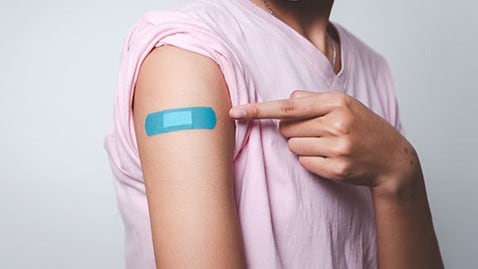Key points
- CDC recommends meningococcal vaccination for all preteens and teens, as well as other children and adults at increased risk.
- Meningococcal vaccines are the best way to protect against meningococcal disease, but side effects can occur.
- Talk to a vaccine provider if you have questions about meningococcal vaccines.

Overview
There are 3 types of meningococcal vaccines used in the United States:
- Meningococcal conjugate or MenACWY vaccines
- Serogroup B meningococcal or MenB vaccines
- Pentavalent or MenABCWY vaccine
Why getting vaccinated is important
Meningococcal disease is uncommon but can cause serious illness and death in people of all ages. Meningococcal vaccines help protect against meningococcal disease.
Who should and shouldn't get vaccinated
Vaccine recommendations
CDC recommends meningococcal vaccination for
- All preteens and teens
- Children 2 months through 10 years old at increased risk
- Adults 19 years and older at increased risk
Allergies, reactions: Talk with a vaccine provider
Talk to a vaccine provider about your vaccination history and a specific vaccine's ingredients. There may be times when someone shouldn't get a meningococcal vaccine, like if they:
- Had a life-threatening allergic reaction after the vaccine
- Have a life-threatening allergy to any part of the vaccine
How well they work
Vaccines that help protect against meningococcal disease work well but cannot prevent all cases.
Possible side effects
Most people who get a meningococcal vaccine don't have any problems with it. Like with medicines, there is a chance of side effects with vaccines. These are usually mild and go away on their own within a few days, but serious reactions are possible.
MenACWY vaccines
MenB and MenABCWY vaccines
If problems occur after MenACWY vaccination, they usually last for 1 or 2 days.
If problems occur after MenB or MenABCWY vaccination, they usually last for 3 to 5 days.
Finding and paying for vaccines
Vaccination locations
Children and teens
Meningococcal vaccines are part of the routine childhood immunization schedule. Therefore, they are regularly available for children at
- Pediatric and family practice offices
- Community health clinics
- Public health departments
Adults
For adults, a healthcare provider's office or pharmacy are usually the best places to receive recommended vaccines. If your healthcare provider doesn't have meningococcal vaccines, ask for a referral.
Federally funded health centers can also provide services if you don't have a regular source of health care. Locate one near you.
You can also contact your health department to learn more about where to get vaccines in your community.
Vaccine costs
There are several ways to cover the cost of meningococcal vaccines.
Private health insurance
Most private health insurance plans cover these vaccines. Check with your insurance provider for cost information and for a list of in-network vaccine providers.
Vaccines for Children program
The Vaccines for Children (VFC) program provides vaccines to children whose parents or guardians may not be able to afford them.
Resources
Vaccine schedules
Parent-friendly schedule for children (birth through 6 years)
Parent-friendly schedule for children (7 through 18 years)
Easy-to-read schedule for adults (19 years and older)
Meningococcal Vaccine Information Statements
MenACWY: English | Other languages
MenB: English | Other languages
Vaccine requirements
MenACWY vaccine requirements for secondary schools
MenACWY vaccine mandates for colleges and universities
Other resources
Adult vaccine assessment tool: What vaccines do you need?
Cochlear implants and vaccination recommendations
Educational materials on meningococcal disease
Meningococcal disease and people receiving complement inhibitors
- Outbreaks specifically caused by serogroup A, C, W, or Y meningococcal disease.
- Outbreaks specifically caused by serogroup B meningococcal disease.
